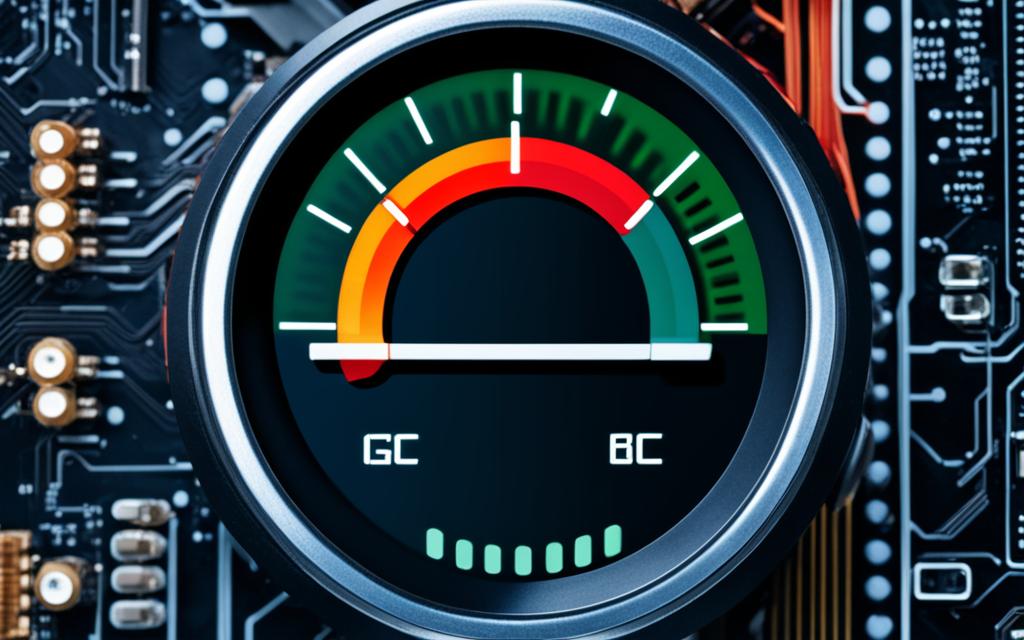Table of Contents
Understanding if 80°C is too hot for a CPU is crucial. It affects your device’s performance and lifespan. Modern CPUs, such as the Intel i9 series, are designed to work safely around this temperature. However, if the temperature stays too high for too long, it could lead to damage1.
Many users experience temperatures in the mid-50s to low-60s Celsius during normal gameplay. But during intense tasks, temperatures can rise to between 75°C and 83°C. While CPUs can cope with these temperatures temporarily, it’s important to keep an eye on them. This helps prevent any harm to the hardware’s long-lastingness. Paying attention to safe temperature guidelines will help maintain your CPU’s best performance.
To learn more about keeping your CPU in top condition, take a look at information on managing CPU temperatures. Knowing how to monitor your CPU properly is key to achieving peak performance.
Key Takeaways
- Safe CPU temperatures usually range from 30°C to 70°C, depending on the task.
- Going over 80°C may cause problems and damage in the long term.
- It’s vital to watch your CPU’s temperature, especially when under a lot of stress.
- Dust build-up and poor cooling can push CPU temperatures up significantly.
- Using tools like Core Temp or NZXT’s CAM can help keep temperatures in check.
- Taking steps to cool your CPU can improve its lifespan and stable performance.
Understanding CPU Temperature
Knowing about CPU temperature is key to keeping your computer healthy. It helps make sure the processor works within safe limits. This affects how well and long the computer works. Normal CPU temperatures are between 40–65°C (104–149°F) under regular use2. The best range for a CPU is about 45-60°C (113–140°F) when it’s not too busy2. By keeping an eye on these numbers, you can stop overheating problems.
Importance of Monitoring CPU Temperature
It’s crucial to check your CPU’s temperature often. A very hot CPU, with temperatures over 80-85°C (176–185°F), can be dangerous2. Being proactive lets you fix cooling issues early, avoiding damage to your computer. You can see the temperature in the BIOS/UEFI when your computer starts. Or, use tools like Core Temp and SpeedFan for easy, real-time monitoring2.
What Causes Variations in CPU Temperature?
CPU temperature changes for several reasons. The workload has a big impact; hard tasks like gaming can push temperatures to 70–80°C (158–176°F)2. Not having good cooling, too much dust, and poor airflow can also raise temperatures. For example, Ultrabooks might reach up to 75°C (167°F) in typical use2. Knowing why temperatures change helps you keep your computer running smoothly.
Is 80 Degrees Celsius Hot for a CPU?
Understanding if 80 degrees Celsius is too high for a CPU means knowing the normal range for CPU temperatures. Most CPUs work well between 30 to 70 degrees Celsius under usual conditions. It’s crucial to keep an eye on the temperature to avoid problems.
General CPU Temperature Guidelines
CPUs typically have a maximum temperature of about 85-90 degrees Celsius. However, staying above 70 degrees Celsius can harm performance and might cause damage3. For day-to-day tasks, you can expect temperatures of 40-65°C. But, using a lot of resources can push this to 70-80°C2. Going over 80 degrees Celsius for too long can cause thermal throttling. This means your computer’s performance will drop4.
Safe Operating Temperatures for Different CPUs
Every CPU model has its own guidelines for safe temperatures. It’s important to follow these to keep your CPU in good shape and prevent overheating3. Dust buildup and not having enough cooling can raise your CPU’s temperature a lot2. That’s why having good cooling, like effective heat sinks and fans, is important. This keeps the temperature safe, especially when your computer is working hard4.
Recognising Good and Bad CPU Temperatures
Knowing what good CPU temperatures look like is crucial for your system’s best performance and long life. Spotting bad CPU temperatures helps avoid serious harm and keeps processes running well. For idle periods, temperatures should be between 30°C and 40°C. While under load, it’s best to stay between 60°C and 70°C. Going over 80°C when things get tough can cause risks of overheating. This might harm your hardware.
Ideal Temperature Ranges for Idle and Load
Here are more details on what temperatures to aim for:
| State | Temperature Range (°C) | Temperature Range (°F) |
|---|---|---|
| Idle | 30 – 40 | 86 – 104 |
| Moderate Load | 60 – 70 | 140 – 158 |
| Heavy Load | 80 – 85 | 176 – 185 |
Potential Risks of Overheating
Not keeping your CPU cool can cause big problems. Running too hot for too long may break parts, leading to expensive fixes. Intel’s research shows CPUs getting hotter than 80°C can seriously impact their performance and shorten their useful life5. So, it’s important for everyone to keep an eye on temperatures. Just a few degrees too high can be very bad news6.
Tools like Core Temp or NZXT’s CAM help you watch your CPU’s heat levels7. With regular checks and an eye on the signs of overheating, you can keep your system safe. This also makes your computer run better.
Why Does My CPU Run Hot?
It’s important to know why CPU temperatures go up to keep them working well. High temperatures can happen for many reasons. Dust buildup, bad cooling, and overclocking are common causes. Dust can block the CPU’s cooling system, making it hard to cool down properly. This increases the risk of your CPU getting too hot.
Common Reasons for Elevated CPU Temperatures
High CPU temperatures can be worrying but are usually caused by familiar issues. For example, CPUs can get much warmer than the room. Sometimes, cooling fans can’t keep up8. Overclocking boosts performance but makes CPUs work harder and get hotter. So, it’s crucial to check your cooling system to ensure it meets your CPU’s needs.
Impact of Dust Accumulation and Poor Cooling
Dust makes it harder for your CPU to stay cool and puts more pressure on cooling systems. Also, a clean and airy space is needed as even a small rise in room temperature can slow down your computer9. CPUs should stay below 75°C when not in use for the best performance. Higher temperatures can make your CPU slow down during heavy tasks10. Regular cleaning and a good cooling system are key to keeping temperatures down and making your processor last longer.
FAQ
What is considered an optimal CPU temperature for performance?
Ideal CPU temperatures are 30°C to 40°C when idle and 60°C to 70°C under load. These temperatures help improve performance and extend your CPU’s life.
Is 80 degrees Celsius too hot for my CPU?
CPUs can run safely around 80°C. However, staying at this temperature too long can harm performance and the CPU itself. It’s important to keep an eye on your CPU’s temperature.
What factors contribute to variations in CPU temperature?
CPU temperature can change due to room temperature, CPU model, how hard it’s working, and cooling system efficiency. Regular cleaning is key to managing dust and keeping airflow smooth.
How can I prevent my CPU from overheating?
Ensure good airflow for your CPU, clean vents regularly, and use effective cooling. Try not to overclock too much without the right cooling system.
What are the risks associated with elevated CPU temperatures?
High CPU temperatures can damage components, shorten the CPU’s life, and cause system failures. Checking your CPU’s temperature often can prevent these issues.
Why should I monitor my to ensure optimal performance?
Keeping track of CPU temperature helps prevent overheating. This way, you can maintain peak performance and avoid hardware problems.
Source Links
- https://www.noyafa.com/blogs/knowledge-base/good-cpu-temperature – What Is A Good CPU Temperature? A Guide to Keep Your Processor Cool
- https://www.avast.com/c-how-to-check-cpu-temperature – How to Check and Monitor Your CPU Temperature
- https://softwareg.com.au/blogs/computer-hardware/is-80-degrees-celsius-hot-for-a-cpu – Is 80 Degrees Celsius Hot For A CPU
- https://community.spiceworks.com/t/what-is-a-normal-temperature-for-a-cpu-and-how-do-i-keep-it-low/948818 – What is a normal temperature for a CPU and how do I keep it low?
- https://ms.codes/blogs/computer-hardware/what-temperature-is-too-hot-for-cpu – What Temperature Is Too Hot For CPU
- https://www.avg.com/en/signal/check-cpu-temperature – How to Check and Monitor CPU Temperature on Windows and Mac
- https://forums.tomshardware.com/threads/cpu-1-and-2-are-running-at-80-degrees-c.2835222/ – CPU 1 and 2 are running at 80 degrees (c).
- https://superuser.com/questions/1265417/reaching-nearly-80c-on-cpu-two-minutes-after-boot – Reaching nearly 80C on CPU two minutes after boot
- https://www.makeuseof.com/tag/pc-operating-temperatures-hot-hot/ – PC Operating Temperatures: How Hot Is Too Hot?
- https://discussions.apple.com/thread/2087171 – 80 degrees C is too hot for an Intel CPU












